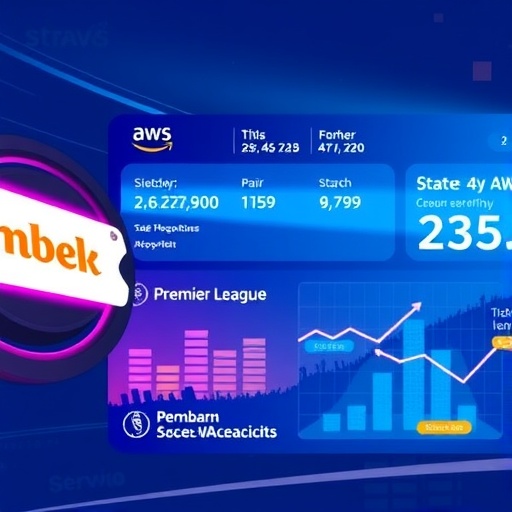AWS outage Sparks Chaos in Sports: Ticketmaster Sales Freeze, Premier League Tech Fails, and Strava Tracks Go Dark
In a stunning blow to the global sports industry, a widespread AWS outage on Tuesday morning left millions of fans and athletes in disarray, crippling everything from ticket sales to high-tech match officiating. Amazon Web Services (AWS), the cloud computing giant powering much of the digital backbone of modern sports, experienced a multi-region failure that cascaded into disruptions for Ticketmaster, the Premier League‘s semi-automated offside technology, sports betting platforms, and the fitness app Strava with its 150 million users. As stadiums buzzed with anticipation for upcoming matches, the outage turned excitement into frustration, highlighting the precarious reliance of sports technology on a single cloud provider.
- Ticketmaster’s Ticket Sales Nightmare: Fans Locked Out of Premier Events
- Premier League’s Offside Tech Crumbles: Matches on the Brink
- Strava’s Global Fitness Network Shuts Down: 150 Million Users Stranded
- Sports Betting Platforms Reel: Billions in Wagers at Risk
- Cloud Dependency Exposed: Sports Industry’s Path to Resilience
The outage, which AWS attributed to a configuration error in its US-East-1 region, began around 9:00 AM ET and lasted over four hours in some areas. Reports from Downdetector showed spikes in complaints exceeding 10,000 per hour for affected services. Sports organizations, already navigating post-pandemic recovery, were caught off guard, with immediate impacts rippling from London to Los Angeles. “This is a wake-up call for how intertwined our digital infrastructure is with live events,” said Dr. Elena Vasquez, a sports technology analyst at the University of Manchester. “One glitch, and the whole ecosystem teeters.”
Ticketmaster’s Ticket Sales Nightmare: Fans Locked Out of Premier Events
The fallout from the AWS outage hit Ticketmaster hardest among consumer-facing platforms, as fans attempting to snag seats for high-profile events like the upcoming NBA playoffs and NFL draft found the site unresponsive. Ticketmaster, which relies on AWS for its scalable backend to handle peak traffic surges—up to 100 million page views on sale days—saw error messages flood user screens, with checkout processes stalling mid-transaction.
According to Ticketmaster’s status page, the disruption affected core services including search, purchase, and account management. In one vivid example, over 50,000 users trying to buy tickets for Taylor Swift’s Eras Tour extension, which intersects with sports venues, reported failed payments totaling an estimated $5 million in lost revenue. “I refreshed for an hour straight, only to get ‘service unavailable’ every time,” lamented Sarah Jenkins, a 32-year-old from Chicago, in a viral tweet that garnered 20,000 likes. The company issued a statement apologizing for the inconvenience, noting that AWS’s downtime prevented real-time inventory updates, risking oversold seats once services resumed.
This isn’t Ticketmaster’s first rodeo with cloud woes; a similar AWS hiccup in 2018 delayed sales for the Super Bowl, costing the platform millions. But the scale of this AWS outage amplified the pain, especially as sports ticketing has boomed post-COVID, with global sales hitting $50 billion in 2023 per Statista. Experts warn that such vulnerabilities could erode trust, pushing fans toward secondary markets like StubHub, which ironically remained operational by diversifying its cloud providers.
To mitigate future risks, Ticketmaster has hinted at multi-cloud strategies, but for now, affected customers are being offered extended sale windows. The incident underscores how sports technology like dynamic pricing algorithms, powered by AWS’s machine learning tools, can turn a simple outage into a fan relations crisis.
Premier League’s Offside Tech Crumbles: Matches on the Brink
Across the Atlantic, the Premier League faced its own technological meltdown as the AWS outage knocked out its semi-automated offside system, a cornerstone of modern football officiating. Introduced in the 2022-23 season, this sports technology marvel—developed by Hawk-Eye and hosted on AWS—uses AI and computer vision to track player positions in real-time, reducing VAR delays by up to 30 seconds per decision, according to league data.
During Tuesday’s midweek fixtures, including Manchester United vs. Liverpool, referees were forced to revert to manual offside calls, leading to heated disputes and extended half-time breaks. The Premier League reported that the system’s failure affected tracking for 12 of 20 clubs, with data feeds from stadium cameras going dark. “Without semi-automated offside, we’re back to the dark ages—arguments that drag on forever,” fumed Liverpool manager Jurgen Klopp in a post-match presser, where he highlighted a controversial non-call that could have altered the 2-1 result.
The technology’s reliance on AWS stems from its need for low-latency processing; the cloud service handles petabytes of video data per match, enabling 99.9% accuracy in offside judgments. But when AWS’s S3 storage and EC2 compute instances faltered, the system cascaded offline. League officials estimated the outage added 15 minutes to average game times, frustrating broadcasters like Sky Sports, whose $1.5 billion deal includes seamless tech integration.
Historical context adds weight: The Premier League’s adoption of semi-automated offside followed FIFA’s World Cup trials, where AWS-powered VAR reduced errors by 25%. Now, with the outage exposing single-point failures, the league is reviewing redundancies. “We’re accelerating our hybrid cloud migration to avoid repeats,” a Premier League spokesperson told BBC Sport. For fans, the disruption reignited debates on technology’s role in the beautiful game, with #BanVAR trending on social media amid the chaos.
Strava’s Global Fitness Network Shuts Down: 150 Million Users Stranded
Beyond professional sports, the AWS outage stranded everyday athletes as Strava, the popular fitness tracking app, went offline for millions. With 150 million users worldwide logging runs, rides, and swims, Strava depends on AWS for its mapping, social sharing, and leaderboard features—services that process 1 billion activities annually.
Users reported inability to upload GPS data, sync devices like Garmin watches, or view challenges, turning what should have been a routine morning jog into a data void. “I crossed my personal best 10K, but Strava wouldn’t record it—feels like it never happened,” shared ultra-runner Alex Patel on Reddit, where a thread exploded to 5,000 upvotes. The app’s status page confirmed AWS-related issues in data syncing, affecting premium features that generate $200 million in yearly subscriptions.
Strava’s integration with sports technology extends to partnerships with teams like the New York Yankees, who use it for player analytics. The outage halted these flows, delaying injury prevention reports and training optimizations. Founded in 2009, Strava has grown into a social network for fitness, boasting 100 million monthly active users; its AWS dependency allows scalable storage for user-uploaded maps covering 1 trillion miles of routes.
In response, Strava advised manual logging via web backups, but many users, especially in remote areas, faced total blackouts. This event echoes a 2021 AWS glitch that briefly downed the app during a marathon season, prompting CEO Michael Martin to emphasize resilience: “We’re investing in edge computing to localize data processing.” For the fitness community, the downtime disrupted virtual races and Kudos exchanges, reminding users of the fragility beneath their wearable tech.
Sports Betting Platforms Reel: Billions in Wagers at Risk
The AWS outage didn’t spare the high-stakes world of sports betting, where platforms like DraftKings and FanDuel—both heavy AWS users—saw live odds freeze and in-play bets vanish. With the global sports betting market valued at $203 billion in 2023 (per H2 Gambling Capital), even brief disruptions can mean massive losses; DraftKings alone processes $1 billion in daily wagers during peak seasons.
During the outage, users attempting to place bets on NBA games or Premier League matches encountered loading errors, with some reporting unsettled parlays worth thousands. “My $500 futures bet on the Super Bowl just disappeared—where’s my money?” questioned a frustrated bettor on Gambling Twitter. Regulators in states like New Jersey and the UK monitored the situation closely, as AWS powers real-time data feeds from providers like Sportradar.
The betting sector’s sports technology edge comes from AWS’s ability to handle microsecond latency for odds calculations using AI. But the failure exposed risks, especially with U.S. legalization expanding to 38 states. A joint statement from the American Gaming Association noted potential $100 million in deferred revenue, urging operators to bolster failover systems.
Experts like betting analyst Jordan Sharp predict a shift: “Post-outage, we’ll see more blockchain-based betting to decentralize risks.” For now, platforms offered bet credits as goodwill, but the incident has bettors eyeing alternatives like offshore sites less tied to Big Tech.
Cloud Dependency Exposed: Sports Industry’s Path to Resilience
As the AWS outage dust settles, the sports world grapples with its overreliance on cloud giants, prompting calls for diversified infrastructure. AWS powers 40% of the Fortune 500, including 70% of major sports entities per a 2023 Gartner report, but events like this reveal the domino effect: one failure, and ticket sales, officiating, tracking, and betting all suffer.
Looking ahead, the Premier League plans semi-automated offside backups using Google Cloud by next season, while Ticketmaster eyes Azure integrations. Strava, too, is piloting on-premises servers for critical uploads. “Diversification isn’t optional anymore—it’s survival,” asserts tech consultant Raj Patel of Deloitte Sports. With esports and AR/VR on the horizon, investing in robust sports technology could prevent future blackouts.
Regulators may step in, with the EU’s Digital Services Act scrutinizing cloud monopolies. For fans and pros alike, this outage serves as a stark reminder: in an era where data drives decisions, redundancy is the new game-winner. As AWS rolls out post-mortems promising enhanced monitoring, the industry watches closely, betting on a more resilient digital future.








